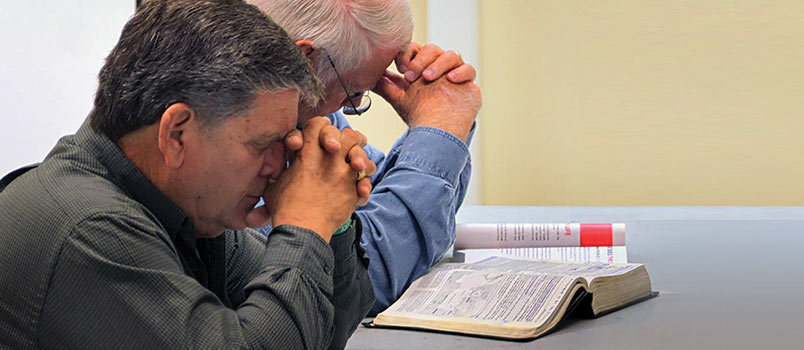 Chuck Hilling, front, and Steve Dyer participate in prayer during their men’s Sunday School class at Northeast Church in Braselton. Northeast Church was the fastest growing Sunday School in 2014 among medium-sized churches (200-399). BRYAN NOWAK/Special[/caption]
Chuck Hilling, front, and Steve Dyer participate in prayer during their men’s Sunday School class at Northeast Church in Braselton. Northeast Church was the fastest growing Sunday School in 2014 among medium-sized churches (200-399). BRYAN NOWAK/Special[/caption] DULUTH — Ten years ago when Eric Rentz became pastor of First Baptist Church of Ludowici, he flipped the pyramid.
A small leadership base was trying to balance the church’s ministries. Equilibrium often failed as the pyramid tipped one way or the other.
With a strong commitment to Sunday School, First Baptist of Ludowici began the hard work of building a sustainable organization. The effort was both intentional and systematic.
“We expected the Sunday School teacher to be multitalented,” Rentz said. “Just like a pastor isn’t multitalented, a Sunday School teacher isn’t either.
Change happened class by class as outreach and care coordinators emerged for each one, along with social and social-media coordinators.
“We evolved into the Sunday School being the major ministry of the church,” Rentz said. “It’s the best way to keep up with people and care for them.”
First Baptist of Ludowici maintains its leadership structure with monthly workers’ meetings where they restate the vision to “win the lost and disciple those we win.”
Ludowici not only broadened its church leadership base, thus flipping the pyramid, it also has frequently landed on the Georgia Baptist Convention’s annual listing of the fastest growing Sunday Schools/small groups in the medium-church category.
From micro to mega, 150 churches emerged in six categories of church size in 2014 as the fastest growing Sunday Schools/small groups in the state. These churches also lead the state in Cooperative Program giving, baptisms, enrollment, and attendance. Yet, these 150 churches represent only about 4% of
GBC churches.
“Disciples have always been made in relational environments,” said Tim Smith, GBC state missionary for Sunday School/small group consultation. “Worship is the front door, but their Sunday School/small groups is what closes the backdoor.”
Assimilation is key for directing visitors to relational, disciple-making environments through Sunday School classes and small groups. Smith affirms the Ludowici model of building organization through classes.
“On average in these churches, every class has at least three leaders per group,” Smith said. “In general, there’s a teacher, an in-reach coordinator (ministry to members), and an outreach coordinator.
“I don’t think anyone is on this list by accident,” Smith said. “You’ve got to be intentional and work.”
Church growth via Sunday School and small groups is not just a small-town phenomenon. The 150 on this year’s list stretch across the state to include rural and metropolitan communities.
Forsyth County has consistently been one of America’s fastest growing counties for the past 15 years. Located about 35 miles north of downtown Atlanta, Business Insider reported in 2015 that Forsyth is the fifteenth fastest-growing county in the nation at 4.6% growth. Only one other Georgia county, Stewart, ranked in the top 15 at number 12 with 4.7% growth.
"Disciples have always been made in relational environments. Worship is the front door,but their Sunday School/small groups is what closes the backdoor."
First Baptist Church of Cumming relocated its campus about ten years ago. Their new facilities have helped to accommodate growth. Soon, they will construct a children’s ministry building.
Cole Wilkins serves as the minister of discipleship and young adults. He says their formula has been simple.
“If you want to reach new people you have to start new groups,” Wilkins said. “And if you want to start new groups, you need new leaders. My adult leaders are really good at spotting new leaders.”
His senior pastor, Bob Jolly, leads the charge for Sunday School/small group growth.
“Our pastor understands the importance of groups and communicates it boldly in his messages,” Wilkins said. “A Sunday morning Bible study group is where we want them to land.”
First Baptist Cumming calls their Sunday morning gatherings Bible Fellowship Groups. As young families and senior adults move into the county, the church adds classes to handle the growth.
“I tell each class that you are going to need at least two teachers and at least one coordinator (couple),” Wilkins said. The first job of the coordinators is to build class structure based upon the needs of the Bible Fellowship Group.
“From day one, our philosophy is that we are looking for long-term sustainable growth that happens by everyday faithfulness,” Wilkins said. “We are looking for both quality and quantity.”
Despite the growth among the top 150 churches, statewide Sunday School/small group growth is plateaued. The GBC offers a host of training opportunities to help all Georgia Baptist churches with quality and quantity. Smith’s team updates online training monthly at www.gabaptistgroups.org. In August, the GBC will conduct eight full-day “Growing Groups Conferences” across the state. Registration is online at www.gabaptistgroups.org.